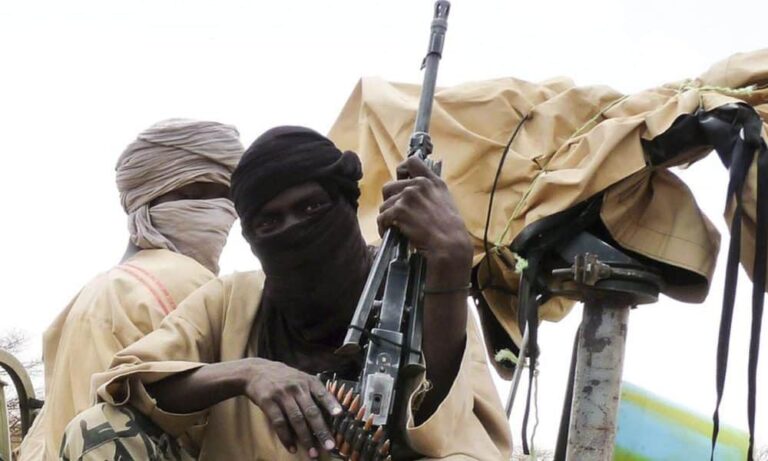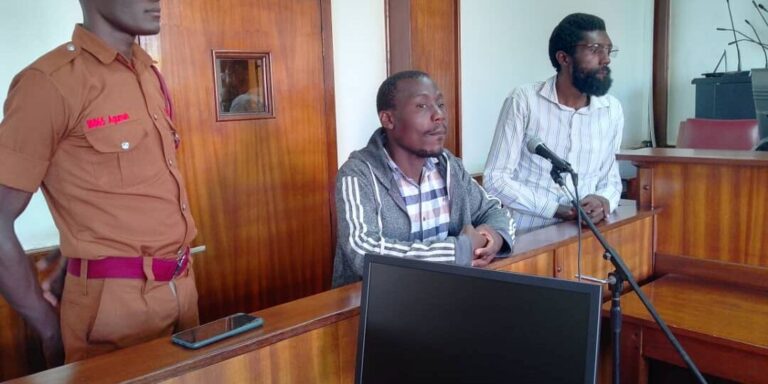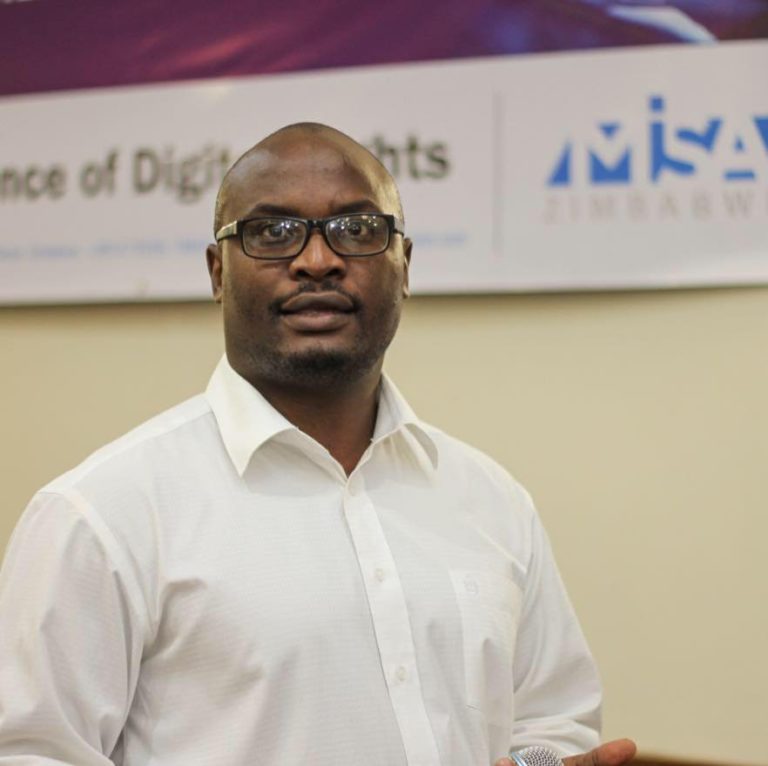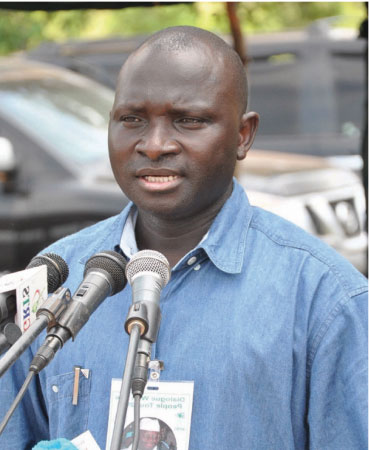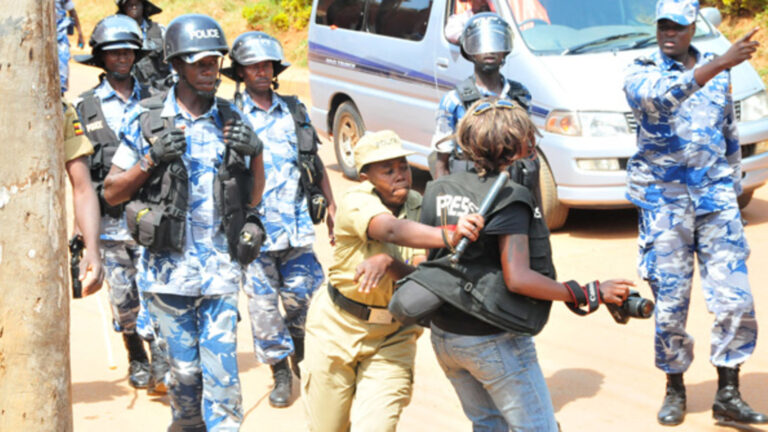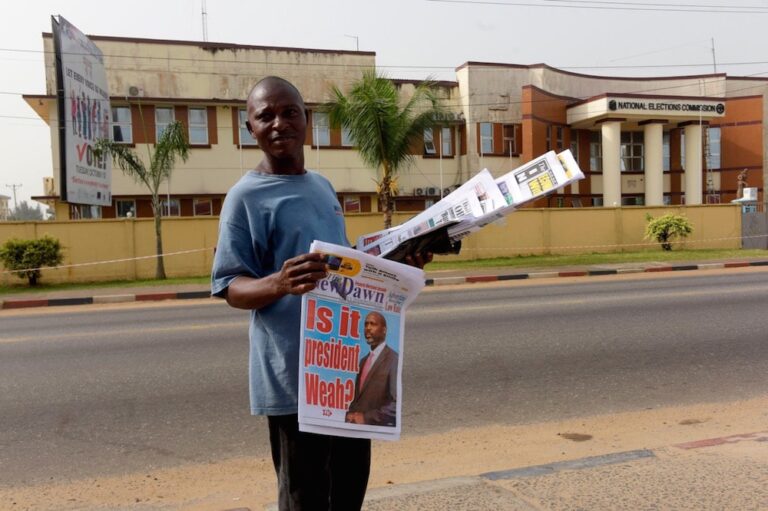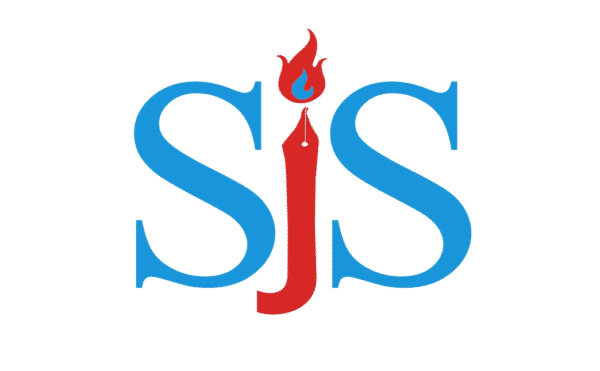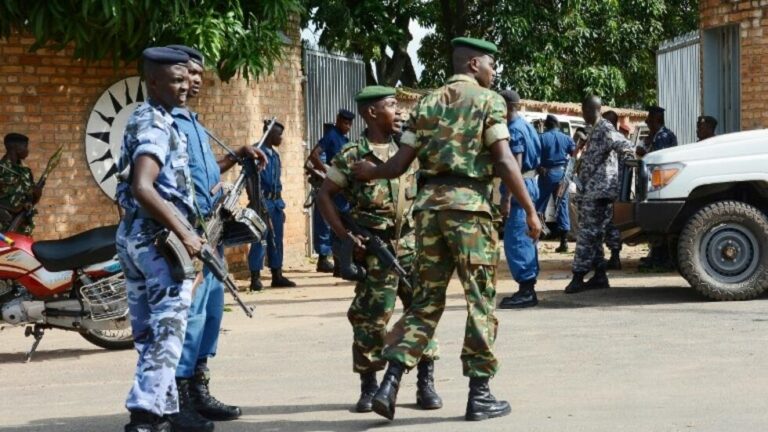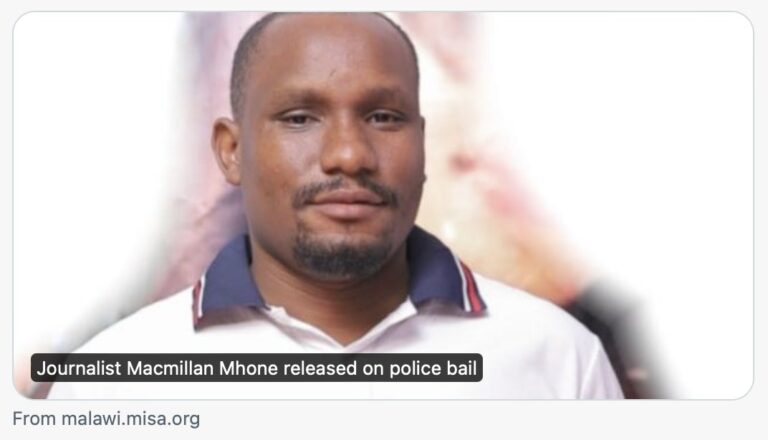I-CSPJ calls for concerted efforts for the release of kidnapped journalists in northern Nigeria
Journalists remanded in prison for reporting about alleged corruption
Kampala; Two (2) journalists Dickson Mubiru and Alirabaki Ssengooba were on Thursday, 20th June 2024, remanded to Luzira Prison, after writing a story related to corruption allegations, which didn’t go down well with those implicated in the story.
Mubiru, the editor, and his reporter Ssengooba used their Grapevine news website to report about investigations into budget misappropriation at parliament.
A few days after their story, the duo was summoned to the Police which led to their arrest on Tuesday and detained at Central Police Station (CPS) until Thursday, when they were produced before a magistrate at Buganda Road Court to take a plea which remanded them to Luzira until 21st June 2024 to apply for the bail.
However, in a dramatic turn of events, their charge changed into “operating an online publication without a valid license” instead of expected defamation.
HRNJ-Uganda condemned the arrest and charges against journalists, arguing that the court plays its custodial role in upholding the freedom of journalists to do their work.
“We condemn the charging of journalists with flimsy crimes for simply doing their work. We urge the court to expedite the process, ensuring that the duo receives swift justice and can resume their important work without further harassment,” HRNJ-Uganda’s Executive Robert Ssempala, said.
He added, “Journalists must be protected, not persecuted for exercising their freedom of expression and holding those in power accountable.”
This particular journalist’s arrest comes at a time when the president has just raised his voice in his effort to stamp out corruption, leading to the arrest and detention of some MPs.
Mali silences critics with harsh prison sentences
A court in Mali has handed a two-year prison sentence to Dr Etienne Fakaba Sissoko to crown two months of harassment of the economist and lecturer of the University of Bamako. The court also fined Dr Sissoko 3 million CFA Francs (about $4,900) in damages.
Sissoko’s charges include harming the reputation of the state, defamation, and dissemination of false news that disturbs the public peace. The charges stem from Sissoko’s book “Propagande, agitation et harcèlement, la communication gouvernementale pendant la transition au Mali”, which examined the military government’s alleged use of propaganda, manipulation, and lies to influence public opinion.
Before his arrest on March 25, 2024, Sissoko had made a Facebook post calling for democratic elections to be held this year as the junta promised after it seized power.
Sissoko’s arrest on March 25 followed closely on the heels of a similar crackdown on a senior army officer, Colonel Alpha Yaya Sangaré. The officer was arrested on March 2, 2024, after he authored a book highlighting the armed forces’ abuses against civilians in their anti-insurgency campaign. Published in late 2023, the 400-page book titled “Mali: Le défi du terrorisme en Afrique” (The Challenge of Terrorism in Africa), angered the junta who issued a rejoinder and followed it up with the arrest.
Freedom of expression has come under attack in Mali, with increasing cases of detentions, and even forced disappearances of people who express dissenting views.
The Media Foundation for West Africa (MFWA) strongly condemns the arbitrary detention and subsequent sentencing of Etienne Fakaba Sissoko and calls for his unconditional release. We urge Malian authorities to guarantee the citizens’ fundamental right to expression as a vital condition for inclusive governance.
MRA condemns abduction of journalist by police
LAGOS, Friday, May 24, 2024: Media Rights Agenda (MRA), today condemned as appalling and unacceptable, Wednesday’s abduction of Mr. Madu Onuorah, Publisher and Editor-in-Chief of the independent online news outlet, Global Upfront newspaper, by operatives of the Nigeria Police Force for allegedly defaming a Reverend Sister based in the United States.
Observing that the Nigeria Police has progressively become a “gun for hire” at the disposal of rich or powerful individuals or organizations who wish to silence journalists or to punish them for critical reporting, MRA argued that by constantly diverting and wasting Nigeria’s security resources to hound journalists all over the country at the behest of government officials, other rich and powerful individuals, as well as organizations, the law enforcement agency has become incapable of performing its most important function of ensuring the security of Nigerians, resulting in an upsurge in violence crimes across Nigeria.
At about 6.00 pm on May 22, 2024, 10 heavily armed policemen reportedly stormed Mr. Onuorah’s home in Lugbe area of Abuja in two Sienna buses and in the presence of his wife and children, forcibly arrested and took him away without presenting any warrant of arrest or disclosing any reason for his arrest. The police seized Mr. Onuorah’s phones to prevent him from reaching his family, friends, and lawyer despite pleas from his family. He was initially taken to the Lugbe Police Station from where he was later taken to Enugu.
The Enugu State Police Command later said, through its spokesman, Mr. Daniel Ndukwe, an Assistant Superintendent of Police (ASP), that Mr. Onuorah was duly arrested in Abuja with the assistance of police operatives from Ebonyi State Command and the aid of intelligence, after efforts made to formally invite him failed. The arrest, according to ASP Ndukwe followed the receipt of a written petition to the Commissioner of Police, Enugu State Command, against him over an alleged defamatory publication he made against a US-based Reverend Sister.
In a statement condemning the actions of the Police, MRA’s Programme Officer, Ms Esther Adeniyi, described as ridiculous and nonsensical the claim by the Police that Mr. Onuorah was only arrested “after efforts made to formally invite him failed”, saying it is a clear indication that the journalist was never invited by the Police and that there was no justification whatsoever for the huge public resources apparently wasted in dispatching policemen from Enugu and Ebonyi States to Abuja to abduct the journalist and bring him to Enugu.
She argued that public resources should not be used to protect the reputations of individuals, adding that a Reverend Sister based in the United States would never write a petition to the Police for alleged defamation of character in that country but has chosen to do so in Nigeria knowing that she could successfully abuse the system by procuring the services of the Police for her personal vendetta.
Ms Adeniyi said: “We are extremely concerned that the Police are wasting government resources – human, material, and financial – to go to such lengths to prosecute what should ordinarily be a civil matter, rather than concentrating their efforts on more important security issues in the country, including in the South East. The world has since moved away from criminal defamation, which is inconsistent with regionally and internationally established norms and standards for the protection of the right to freedom of expression and media freedom. Nigeria cannot remain stuck in this antiquated practice.”
Besides, she noted, not having conducted any investigation into the subject matter of the report complained about to establish its truth or otherwise or to determine whether any offence had actually been committed, it was clearly premature and irrational for the Police to take such aggressive action against the journalist, unless they had an agenda that they were pursuing against him.
Ms Adeniyi said: “MRA finds appalling and unacceptable this tactic by law enforcement and security agencies of arresting journalists Gestapo-style, transferring them to other far away locations several hundreds of kilometres away from where they live and work, and detaining them incommunicado without any warrant of arrest and frequently without formally charging them with any offence.”
Although she expressed relief that Mr. Onuorah has now been released, she called on the Federal Government, particularly the Minister of Justice and Attorney-General of the Federation as well as the Inspector-General of Police, to put an end to the culture of impunity for the repeated violation of constitutionally protected rights by the Police and other security and law enforcement agencies, urging that all those responsible for the journalist’s unlawful and unconstitutional arrest and detention should be held accountable.
For further information, please contact:
Idowu Adewale
Communications Officer,
Media Rights Agenda
Tel: +234 806 524 0610
E-mail: [email protected]
MISA highlights freedom of expression issues at 79th session of ACHPR
Chairperson, Excellencies, Honourable Commissioners, state delegations, ladies and gentlemen, the Media Institute of Southern Africa MISA presents this statement during the 79th Session of the African Commission on Human and Peoples’ Rights (ACHPR).
AI adoption, threats and opportunities
The past few years have seen an acceleration in the adoption and use of artificial intelligence (AI), machine learning and other new technologies that will change how we communicate and access information. AI can help entrench democracy by improving access to information, freedom of expression, and freedom of association. However, AI can also amplify misinformation and disinformation and encourage surveillance, which serves to undermine the democracies that we seek to build.
Honourable Commissioners, in 2021, the ACHPR passed Resolution 473 on the need to undertake a study on human and people’s rights and artificial intelligence. I am also cognizant of the ongoing African Union Commission consultative processes on the same, where MISA made formal submissions.
In furtherance to that, MISA calls on the ACHPR to urgently develop and adopt principles for an AI policy framework. The framework should focus on how new and emerging technologies can be used to promote democracy rather than undermine individual liberties. The principles should also call upon state parties to adopt a human rights-based approach to using AI and other technologies. Priority should be given to transparency and accountability in gathering data.
My organisation, MISA, has developed a policy framework for southern Africa, and we are at hand to assist the Commission on this, particularly on issues of media freedom, privacy and access to information.
Media viability
The media is central to how citizens access information and engage in civil life. However, the media continues to face new pressures that centre on viability, which threaten its very existence. Without credible media, disinformation and misinformation thrive, again posing a threat to democracy. Therefore, strategies that focus on media viability are needed to help foster democracies.
For example, the EU, Canada, and Australia, among others, have engaged the big tech platforms that benefit from the news media to see how these can work with the media to ensure viability. Other regions have already set the pace, and it is in the interests of the continent to come up with a unified approach to engaging these very large online platforms.
Elections and the media
This year has been christened the Year of Democracy. There will be massive elections across the world. In Southern Africa, where MISA operates, elections at presidential, national assembly and local government levels will be held in Botswana, Comoros, Madagascar, Mauritius, Mozambique, Namibia, Tanzania and South Africa.
Honourable Commissioners, past experiences have shown that journalists are vulnerable to attacks during elections. What is worrying in this case is that some of the countries holding elections this year have seen a decline in the World Press Freedom Index. While Namibia remains highly ranked globally, Botswana and Mozambique’s decline is worrying. Last December, a journalist was killed in Mozambique, and his assailants are yet to be accounted for.
In Botswana, the surveillance of journalists continues to be of concern. Last year, the security services confiscated the gadgets and detained two journalists with the aim of uncovering their sources of news. This is chilling to press freedom and undermines investigative journalism.
Honourable Commissioners, we are reaching out to you to call on state parties to reaffirm their commitment to the safety of journalists and freedom of expression. Elections and citizen participation are key to democracy, and for democracy to function properly, the media must operate freely to enhance access to information so that citizens can make informed decisions about how they are governed.
Shrinking civil space
Of note, Honourable Commissioners, is that authoritarianism is on the rise globally, with a strong surge in right-wing politics. A key characteristic of this is shrinking civic space and constrained civil liberties. We have raised this issue at this platform, and we cannot tire of doing so at every opportunity.
Specifically, Angola has developed a draft NGO law, which ostensibly complies with the Financial Action Task Force recommendations. However, the law imposes excessively harsh regulatory, supervisory, and disciplinary measures, including the power to suspend and terminate NGOs, that would severely curtail the independence and autonomy of Angolan CSOs.
Mozambique has also proposed a similar law under the guise of complying with the FATF recommendations. Just as with Angola, the Mozambican law has the potential to curtail freedom of association, as it gives the government absolute and discretionary powers to create and control CSOs and suspend their operations.
In Zimbabwe, we were hopeful that this trend would be reversed when President Emerson Mnangagwa declined to sign the Private Voluntary Organisations (PVO) Amendment Bill into law. However, the president immediately called for the proposed law to be debated in the legislature, indicating a desire to sign it into law. The PVO Amendment Bill, like in the case of Angola and Mozambique, severely limits the operations of CSOs and encumbers the operations with broad government supervision. The government will have the authority to refuse registration and suspend the operations of CSOs. This infringes on the freedom of association that is guaranteed in the Constitution.
Similar laws have already been adopted in countries such as Tanzania, Botswana, and Malawi in the Southern African region.
The three examples are endemic to shrinking civic space in the region. MISA calls on the ACHPR to open dialogue with FATF, pointing out how its recommendations are being used to stifle the operations of legitimate civil society organisations.
Safety of journalists
Honourable commissioners, a disturbing trend emerged this year, where the security services threaten journalists over investigative reporting. In Malawi, the investigative journalist Gregory Gondwe had to go into hiding after receiving credible threats that the military MDF intended to arrest him for allegedly “endangering state security”. This threat comes from Gondwe’s story on the military’s plans to purchase 32 armoured vehicles from a company implicated in corruption. The company in question is reportedly run by businessman Zuneth Sattar, who faces allegations of corruption. Gondwe’s story revealed that the Malawi Defence Force had paid $4,98 million to a company run by Sattar and the payment was part of a deal worth $20 million.
In Zimbabwe, NewsHawks had to stop writing stories about three military personnel after the online platform reported that it had received “subtle threats and direct pressure” from state security agents.
Such threats have a chilling effect on media freedom and instil a culture of self-censorship. Self-censorship, particularly by the media, threatens public participation and, therefore, democracy.
The media helps citizens understand the true state of affairs in their country so that they can make informed decisions. It is also a platform for debate and enables people to make up their minds, particularly on governance issues. However, in a climate of self-censorship, citizens are deprived of information vital to open, wholesome public debate, which affects decision-making and, ultimately, democracy.
Honourable Commissioners, we urge you to encourage State parties, particularly Malawi and Zimbabwe in this case, to reaffirm their commitment to freedom of the media and freedom of expression, as enshrined in their respective constitutions.
MISA remains open to constructive engagement with the governments of Southern Africa through the Southern African Development Community secretariat.
Access to universal rights online
The migration of the bulk of countries in Africa towards electronic court case management should be understood within the broader context that the judicial services have to be accessible to all and not leave anyone behind, particularly the marginalised and vulnerable groups, as the world becomes increasingly digitised.
Esteemed commissioners, please allow me to bring to your attention that in Africa, as of 2022, only 36% of the citizens have access to the internet, according to the World Bank.
The statistics do not further explain whether this is meaningful access to the internet. As you are aware, internet access is driven by mobile network operators, which pursue the profit motive. In communities such as rural areas with limited economic access, there is no motivation to connect these communities.
In this regard, the pace with which the judicial services are migrating to online platforms must be alive to these realities and ensure that these marginalised communities are not left behind as they are not connected.
We urge the ACHPR to
- Call on State parties to develop and adopt principles of an AI policy framework, whose focus is on how new and emerging technologies can be used to promote democracy rather than undermine individual liberties
- Come up with a platform to engage very large online platforms on how they can enhance democracy in Africa and promote media viability
- Call on State parties to reaffirm their commitment to freedom of expression and the safety of the media, particularly during election periods
- Migration of services online, such as judicial services, should be proportionate to internet and telecommunication services development across member states through the transparent and accountable use of Universal Services Funds.
The statement by MISA Regional Secretariat Director, Dr Tabani Moyo, was presented virtually at the 79th Ordinary session of the African Commission of Human and Peoples’ Rights on the 17th of May 2024.
AFEX welcomes guilty verdict of former Gambian Minister
On May 15, 2024, the Federal Criminal Tribunal a.k.a Federal Criminal Court (FCC) in Bellinzona, Switzerland, found Ousman Sonko, Former Interior Minister of The Gambia, guilty of committing crimes against humanity, including the torture of two journalists.
Sonko faces 20 years imprisonment. He was initially arrested in Switzerland in January 2017 after TRIAL International filed a criminal denunciation against him.
The sentence is another historic leap on the path to justice following the heinous human right violations committed under the reign of former president of The Gambia, Yahya Jammeh.
Ousman Sonko’s arrest follows the first historic conviction linked to Yahya Jammeh’s 22 years reign of terror in The Gambia, of Bai Lowe in Germany on November 30, 2023. Bai Lowe was identified to be a member of the “Junglers” paramilitary junta, formed by Yahya Jammeh, and was discovered to be the driver for the unit whose role was principal in the murder of journalist Deyda Hydara in 2004.
Ousman Sonko served as Interior Minister from 2006 to 2016 and was instrumental in executing Jammeh’s systematic repression against his opponents, particularly journalists who were often detained and tortured by Gambian authorities for being vocal about the inactions of Jammeh according to media reports.
The negative impact of Jammeh’s reign in The Gambia revolutionised the conduct of journalism in the country and ushered in a devaluation of journalism. This devaluation stifled journalism and led to a forced departure of many journalists from the profession.
The African Freedom of Expression Exchange (AFEX) welcomes the outcome of the FCC as a major milestone in The Gambia’s quest for accountability and as a means of retributive justice for the journalists and other individuals who were unable to get justice for the human rights violations they suffered.
World Press Freedom Day 2024: HRNJ reaffirms its commitment to protect press freedom
KAMPALA, May 3, 2024 – The Human Rights Network For Journalists-Uganda (HRNJ-Uganda) stands united with the global community on this year’s World Press Freedom Day under the theme “A Press for the Planet: Journalism in the Face of Environmental Crisis.”
The timing of this theme could not be more crucial as Uganda grapples with the harsh realities of climate change, witnessing prolonged dry seasons and intense rainfall as the new norm. This juxtaposition places Uganda in a precarious position where dry seasons bring hardship, yet heavy rains bring devastation, highlighting the urgent need for action.
The root cause of this dilemma lies in environmental degradation, with vast forests sacrificed for commercial ventures, weakening the land’s ability to withstand heavy rainfall. The resulting floods wreak havoc on homes, crops, and businesses, posing a dire threat to current and future generations.
While journalists are pivotal in informing society, their ability to report on environmental issues is hindered by powerful individuals and state entities, making it a dangerous endeavor. Shockingly, since 2020, 12 journalists have been arbitrarily arrested while covering environmental degradation, impeding their crucial role in raising awareness.
Specific cases such as the obstruction of coverage on illegal logging in Zoka rainforest and protests against projects like the East African Crude Oil Pipeline highlight the pervasive risks faced by journalists striving to expose environmental degradation.
Our annual Press Freedom Index paints a bleak picture of escalating abuses against press freedom in Uganda, underscoring the urgent need for action. We call on the government to uphold an independent and pluralistic media that holds all accountable for environmental degradation.
Moreover, ensuring fair compensation for journalists, ending impunity for crimes against them, and enhancing their capacity on environmental issues are crucial steps towards addressing the knowledge gap.
We urge the Ugandan government to fully implement the 10th principle of the Rio Declaration, granting every individual access to environmental information. Media outlets and journalists must actively engage the public on the perils of environmental degradation, fostering discussions for sustainable solutions.
In recognition of journalists’ crucial role, we advocate for World Press Freedom Day to be gazetted as a public holiday, providing stakeholders with the opportunity to reflect on annual challenges within the industry.
On this World Press Freedom Day, we extend our wishes to journalists across all platforms, acknowledging their invaluable contributions to safeguarding press freedom and environmental protection.
For God and My country
ROBERT SSEMPALA,
EXECUTIVE DIRECTOR
World Press Freedom Day 2024: CEMESP issues call to action
On World Press Freedom Day, the Center for Media Studies and Peacebuilding (CEMESP) released a poignant statement, echoing the sentiments of a nation grappling with the complexities of its media landscape.
At the CEMESP office in Monrovia on Thursday, Program Assistant Wremongar Blojay Joe II, on behalf of CEMESP’s Director Malcolm W Joseph, conveyed the media development group’s message calling for impactful change through new ideas and innovation.
He stated, “Liberia stands at a critical juncture in its media landscape, as the world commemorates World Press Freedom Day on May 3, 2024.”
Drawing from the latest Press Freedom Index for Liberia by Reporters Without Borders, Joe outlined a picture that celebrates the strides made since the end of the civil war while acknowledging persistent challenges, pointing fingers at political interference, ownership, and poor welfare of journalists.
“Despite improvements,” he noted, “political interference in media ownership and content remains a concern.”
He underscored the importance of recent legislative reforms, including the elimination of sedition and defamation laws, as progress towards a more conducive environment for press freedom.
Yet, amidst these advancements, the CEMESP Program Associate highlighted the stark reality of journalists facing economic hardships and the enduring specter of self-censorship due to lack of advertisement and poor management of media entities.
“Many credible reports have spoken to the unacceptable levels at which self-censorship persists,” he lamented, particularly on sensitive topics such as corruption and abuse of power.
The CEMESP statement did not shy away from addressing the darker side of press freedom in Liberia, adding “We continue to witness instances where Liberian law enforcement remains a source of insecurity for journalists.”
The statement urged authorities to ensure accountability for attacks on press freedom.
“The voices of journalists are essential for fostering transparency, accountability, and democracy in Liberia. Liberian authorities must ensure that security personnel who attack journalists are punished for their actions.”
Joe also lauded and emphasized the resilience and diversity of Liberia’s media landscape, calling for concerted efforts to safeguard the safety and freedom of journalists.
He rallied stakeholders to support the establishment of a Media Commission which, according to him, will be responsible for advocating for independent oversight within the media sector.
As the statement reached its climax, Joe called for action in the face of the environmental crisis, aligning with this year’s theme of “Press for the planet.”
“Climate education remains almost nonexistent in Liberia, with inadequate resources and attention devoted to raising awareness about environmental issues.
There is an urgent need to invest in journalists who can serve as educators, effectively communicating climate-related challenges and solutions to the Liberian population,” he declared, urging for prioritized training and empowerment initiatives in environmental reporting.
Joe said he believes that journalists would play a crucial role in fostering climate literacy among citizens and advocating for climate accountability from policymakers and stakeholders and that by empowering journalists with the necessary skills and resources to cover climate issues comprehensively, Liberia can take significant strides towards building a more environmentally aware and resilient society.
He reaffirmed the commitment of the Center for Media Studies and Peacebuilding (CEMESP) to defending press freedom, recognizing it as a fundamental pillar of Liberia’s democratic journey.
“Today, let us reaffirm our commitment,” he concluded, “and press for the planet, our communities, and the integrity of Liberian journalism.”
Media Support Groups Mark 2024 World Press Freedom Day, Urge Governments to Protect Media Freedom
LAGOS, Thursday, May 2, 2024: Four human rights and media support organizations have called on Federal and State Governments to take urgent measures to ensure media freedom and the safety of journalists in Nigeria, saying the deteriorating state of media freedom in country is potentially harmful to its system of democratic governance.
Their call is contained in a statement announcing their collaborative activities to commemorate the 2024 edition of World Press Freedom Day (WPFD 2024) through separate events taking place in Lagos and Abuja on Friday, May 3.
According to the statement, Media Rights Agenda (MRA) and Global Rights: Advocates for Sustainable Justice, in collaboration with the International Press Centre (IPC) and the Centre for Media and Society (CEMESO), will hold a hybrid convening in Lagos under the theme: “The Imperative of Media Freedom for Democratic Governance”, to underscore the vital role that the media play in promoting transparency, accountability, good governance, and democracy.
The event will have media stakeholders drawn from among journalists and editors, media owners and managers, civil society organizations, the academia, and others participating physically and virtually and will include activities such as sharing of experiences by journalists who have faced various forms of attacks, a presentation on the importance of counselling for journalists who have been victims of attacks, as well as presentations on various civil society efforts to ensure the safety of journalists and protect media freedom, which are designed to strengthen the media as they strive to promote democracy, human rights, and social justice.
A separate event will be hosted in Abuja by Global Rights in collaboration with MRA and the International Centre for Investigative Reporting (ICIR). The event will be a Webinar titled “Freedom of the Press in Peril – Raising the Bar for Press Freedom in Nigeria”, which is aimed at sparking a conversation on how to safeguard press freedoms in Africa and how the operational environment for the press can be improved in Nigeria and across the continent.
The event will identify global best practices that create a conducive and enabling environment for the press and share experiences of how they can be domesticated in a way that makes them more easily accessible to journalists and other media professionals in Nigeria.
Proclaimed by the UN General Assembly in December 1993, World Press Freedom Day is celebrated around the world on May 3 every year as a reminder to governments of the need for them to respect their commitment to press freedom and create a safe and conducive environment for journalism and media practice.
Commenting on the collaborative efforts by the various organizations, Mr. Edetaen Ojo, Executive Director of MRA, said: “As the world celebrates World Press Freedom Day on May 3, we wish to reaffirm our commitment to upholding the fundamental principles of free speech, independent journalism, and the protection of press freedoms worldwide knowing that a free and independent media is the oxygen of democracy. We are determined to work with like-minded individuals and organizations towards the emergence of an environment where media professionals can carry out their professional functions without fear or intimidation and where the media can realize its true purpose.”
According to Mr. Lanre Arogundade, Director of IPC, “We recognize the challenges facing journalists and media professionals across the country, including censorship, intimidation, violence, and online harassment. In the face of these threats and attacks, we commend the resilience and courage of journalists who continue to pursue the truth, often at great personal risk. We also promise that we shall continue to render whatever support we can to ensure that the atmosphere is made conducive for them to ply their trade.”
Dr. Akin Akingbulu, Executive Director of CEMESO, said: “We take the opportunity of this important occasion to once again call on governments, civil society organizations, and individuals everywhere to join us in defending press freedom, protecting journalists, and ensuring that information remains a public good accessible to all. Together, let us stand united in support of press freedom and the fundamental principles of democracy.”
For further information, please contact:
Idowu Adewale
Media Rights Agenda
idowu[@]mediarightsagenda.org
Melody Akinjiyan
International Press Centre
Timothy Bamidele
Centre for Media and Society
AFEX condemns the actions of the Somali Government against Somali Journalists Syndicate
The African Freedom of Expression Exchange (AFEX) condemns the freezing of the bank account of the Somali Journalists Syndicate (SJS) and calls on the Somali government to reverse its order to freeze the bank accounts of the media rights group.
On April 13, 2024, the Somali Journalists Syndicate SJS received an email notification from their bankers, Premier Bank indicating that their (SJS) bank accounts had been “frozen” following a letter issued by the Banadir Regional Court located in the capital, Mogadishu. The said letter ordered an investigation into the organisation’s financial transactions.
According to a report by SJS, the court letter dated April 9 2024, and signed by Judge Shueyb Malin Adan stated that SJS was not a registered organisation, and ordered an investigation led by the Office of the Attorney General into individuals involved in the SJS accounts, including SJS Secretary-General Abdalle Ahmed Mumin.
The SJS reportedly believes that this action by Somali authorities is in connection to a recent submission of a legal case against the Somali Government to the UN Human Rights Council on behalf of the SJS and its Secretary-General Abdalle Ahmed Mumin.
The legal case against the Somali government is about the alarming circumstances surrounding the abduction-style detention, persecution, torture, and ill-treatment suffered by Abdalle Ahmed Mumin, at the hands of Somali authorities in Mogadishu.
Journalist Abdalle Ahmed Mumin and co-founder of the SJS since October 2022 has been on the radar of Somali state security forces in reprisal for his work. Mumin was thrice arbitrarily arrested, detained, and tortured by Somali state security forces. His continuous detention in 2023 was condemned by AFEX.
This step taken by Somali state authorities to freeze the bank accounts of the SJS is a clear retaliation and a deliberate attempt to frustrate the activities of the SJS.
AFEX therefore urges the authorities to immediately unfreeze the bank accounts of the SJS. We also urge the authorities to restore journalist Mumin’s rights and freedoms that have been curtailed over the years.
AFEX further urges the Somali Government to be tolerant of divergent views and respect freedom of expression, especially press freedom, and implement safeguards to prevent abuse and torture by security agents who are responsible for the protection of lives.
AFEX condemns the detention of journalist Sandra Muhoza
On April 14, 2024, journalist Sandra Muhoza with online media outlet La Nova Burundi was reportedly arrested by the police and later handed over to their national intelligence agency, Service National de Renseignement (SNR) in Bujumbura. The reason for Muhoza’s arrest is yet to be confirmed.
Prior to her arrest, Muhoza had responded to an interview invitation from an unnamed wealthy businessman affiliated with the ruling party, Conseil National pour la Defense de la Democratie – Forces pour la Defense de la Democratie (CNDD-FDD).
According to La Nova Burundi, Muhoza had in the past reported on the dealings of this businessman.
Human rights defenders have raised concerns in the past concerning detention conditions in SNR’s jail in Bujumbura where Muhoza is presently held.
Burundi’s worsening human rights abuses and restrictions on press freedom has resulted in a large number of journalists fleeing the country since 2015. In 2023, Reporters Without Borders ranked Burundi 114 out of 180 countries in terms of press freedom. Journalists in Burundi continue to live in fear of being threatened, attacked or arrested.
The African Freedom of Expression Exchange (AFEX) is concerned about the safety of Sandra Muhoza especially when no reason has been given for her arrest. AFEX urges state authorities in Burundi to unconditionally release journalist Muhozi to enable her return safely to her family.
AFEX further urges state authorities in Burundi to create an enabling socio-political environment that is tolerant of divergent views and also train security officers to protect the lives of journalists and other media persons.
AFEX urges the promotion of a free press environment to commence a re-establishment of the declined press environment in Burundi.
MISA demands immediate release of arrested Malawian journalist
What happened
MISA demands the immediate release of the Malawi journalist, Macmillan Mhone who was arrested on Monday 8 April 2024 over a story that he wrote in August 2023.
Mhone, who is now employed by the Nation Publications Limited, had written a story for Malawi24, which alleged that businessman Abdul Karim Batatawala was facing various corruption and fraud charges.
The story revealed that the courts had blocked Batatawala from dealing with the government, but the businessman had allegedly set up proxy companies to continue dealing with the authorities.
To add insult to injury, Mhone has reportedly been transferred from Lilingwe to Blantyre, where he is expected to be tried.
The journalist is expected to be charged for publishing news likely to cause fear or public alarm. He was arrested by the police’s Cyber Crimes Division.
Legal precedence in Southern Africa shows that criminalising the publication of news likely to cause fear violates constitutional provisions and does not not amount to a reasonable justification for limiting the freedom of expression.
In Zambia, in 2014, the courts struck down Section 67 of the country’s Penal Code, prohibiting the publication of false information likely to cause public fear, violating the Constitution as it did not amount to a reasonable justification limiting freedom of expression.
In 1999, a Zimbabwean court ruled that criminalising the publication of news likely to cause fear exerts an unacceptable “chilling effect” on freedom of expression, since people will tend to steer clear of the potential zone of application to avoid censure.
MISA’s position
MISA has argued ad nauseam against laws that criminalise the publication of false news.
Any laws that seek to regulate freedom of expression should lean more on the side of entrenching fundamental human rights in line with the constitutional provisions and regional and international instruments that safeguard these freedoms such as the African Commission on Human and Peoples’ Rights (ACHPR) Revised Declaration on the Principles of Freedom of Expression and Access to Information in Africa, among others.
MISA is worried about a pattern that is emerging, where journalists who report on corruption are instead themselves arrested.
Just recently, Gregory Gondwe, an investigative journalist, was forced into hiding after revealing the Malawian government’s planned purchase of 32 armoured vehicles from a company implicated in corruption.
The arrest of Mhone and the threat to detain Gondwe have a chilling impact on freedom of expression in Malawi and engender self-censorship, which are both antithesis to democracy.
Investigative journalists are the lifeblood of democracy, as they hold those in power accountable and promote transparency and good governance.
MISA fears that, with elections due in 2025, there is a real risk that arrests and attacks on journalists may escalate, blighting Malawi’s nascent democracy.
We, therefore, call upon Malawian authorities to immediately release Mhone and drop all charges that he is facing.




